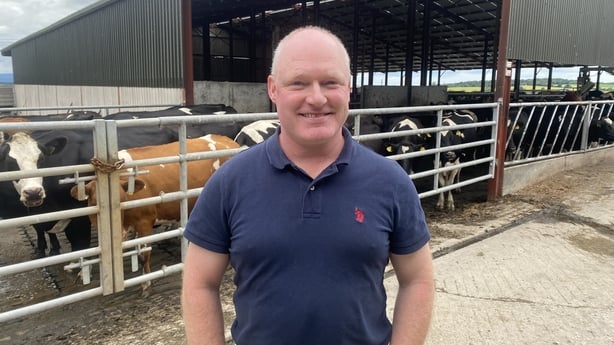Donald Scully is a fourth-generation dairy farmer in Co Laois, but he is not sure the mantle will be passed over to the next generation.
Like many farmers, he did not need to read Teagasc's newly released National Farm Survey to know what a difficult year 2023 was.
"We came into the end of 2023 really really low, with morale, stress, it got to the stage that actually for the first time ever I stopped producing milk last winter, because the books didn't add up, the cost of production outweighed what my return was going to be" Mr Scully said.
"It reduced my losses to dry off my cows, instead of milking them through the whole winter," Mr Scully said, "that was the first time ever that faced me."
Teagasc's latest report showed that in 2023 all farm sectors recorded their lowest average incomes in several years, but after a bumper year in 2022, dairy and tillage witnessed the steepest drops of 69% and 71% respectively.
This has largely been attributed to a sharp decline in milk and cereal prices and lower production volumes, in a period of stubbornly high input prices, against a backdrop of six months of heavy rainfall to the end of the year.
"We came into 2023 coming off maybe a 'false high' of 2022" Mr Scully said, when "we had come out of the whole Covid scenario, and everyone needed product".
But he said the new year brought new challenges.
In 2023 "prices were falling, costs were staying stable, and weather was a huge, huge challenge," Mr Scully said.
He described "the stress of working in the bad weather, animals coming in and out, and the feed bills and everything that goes with that."

But while the Teagasc report deals with incomes in 2023, it seems that 2024 has offered farmers little respite.
"2024 is looking to be more challenging," Mr Scully said.
"We carried debts from 2023 which we couldn't pay, they came into 2024, and of course the weather has still continued being extremely poor, sure just last night we had close to 20ml of rain in three hours," he said.
"We came into the year with no financial back up, we have regulations we have to meet, we have fertiliser registers and all these things we have to follow, we have improvements to do on our farms, but we have no money to do it."
It has all led to some big questions for the Scully family.
Mr Scully said that while family members have expressed an interest in working on the farm into the future, he is now asking himself: "Do I want to encourage that interest?"
At the moment, he said, the answer was: "I don't think so."
"I'm really encouraging all my kids to get a really good college education," he said.
"If this business is viable after their education, great, if not, no way."







